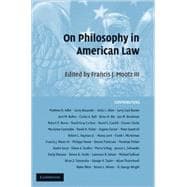
Note: Supplemental materials are not guaranteed with Rental or Used book purchases.
Purchase Benefits
Looking to rent a book? Rent On Philosophy in American Law [ISBN: 9780521883689] for the semester, quarter, and short term or search our site for other textbooks by Edited by Francis J. Mootz III. Renting a textbook can save you up to 90% from the cost of buying.
| Introduction | p. ix |
| Karl Llewellyn and the Course of Philosophy in American Law | |
| On Philosophy in American Law (1934) | p. 3 |
| Law in Life, Life in Law: Llewellyn's Legal Realism Revisited | p. 11 |
| On Realism's Own "Hangover" of Natural Law Philosophy: Llewellyn Avec Dooyeweerd | p. 19 |
| On the Instrumental View of Law in American Legal Culture | p. 27 |
| When Things Went Terribly, Terribly Wrong | p. 35 |
| The Mechanics of Perfection: Philosophy, Theology, and the Foundations of American Law | p. 44 |
| Philosophical Perspectives on Law | |
| Toward Normative Jurisprudence | p. 55 |
| Critical Legal Theory Today | p. 64 |
| Reviving the Subject of Law | p. 73 |
| Law and Creativity | p. 81 |
| The Stories of American Law | p. 88 |
| Areas of Philosophy and their Relationship to Law | |
| On Philosophy in American Law: Analytical Legal Philosophy | p. 99 |
| Political Philosophy and Prosecutorial Power | p. 106 |
| On (Moral) Philosophy and American Legal Scholarship | p. 114 |
| The Aretaic Turn in American Philosophy of Law | p. 122 |
| On Continental Philosophy in American Jurisprudence | p. 130 |
| Psychanalysis as the Jurisprudence of Freedom | p. 139 |
| Philosophical Examinations of Legal Issues | |
| Law as Premise | p. 151 |
| Doing Justice to Justice: Paul Ricoeur | p. 159 |
| Love Is All You Need: Freedom of Thought versus Freedom of Action | p. 167 |
| Legal Philosophy over the Next Century (While We Wait for the Personal Rocket Transportation We Were Promised) | p. 176 |
| Atmospherics: Abortion Law and Philosophy | p. 184 |
| Law, Rhetoric, and Practice Theory | |
| Foundationalism and Ground Truth in American Legal Philosophy: Classical Rhetoric, Realism, and Pragmatism | p. 195 |
| The Irrelevance of Contemporary Academic Philosophy for Law: Recovering the Rhetorical Tradition | p. 205 |
| Dicta | p. 215 |
| Recent and Future Concepts of Law: From Conceptual Analysis to a Practice Theory of Law | p. 223 |
| The Tasks of a Philosophy of Law | p. 232 |
| Questioning the Relationship Between Philosophy and American Law | |
| Law and Philosophy at Odds | p. 241 |
| Jurisprudence: Beyond Extinction? | p. 249 |
| Law and Philosophy in the Hyperreal | p. 257 |
| Philosophy? In American Law? | p. 265 |
| Commentaries | |
| Optimism and Pessimism in American Legal Philosophy | p. 273 |
| This Jurisprudential Moment | p. 279 |
| Fresh Looks, Philosophy-in-Action, and American Law | p. 285 |
| Contributors and Selected Bibliography | p. 295 |
| Name Index | p. 305 |
| Table of Contents provided by Ingram. All Rights Reserved. |
The New copy of this book will include any supplemental materials advertised. Please check the title of the book to determine if it should include any access cards, study guides, lab manuals, CDs, etc.
The Used, Rental and eBook copies of this book are not guaranteed to include any supplemental materials. Typically, only the book itself is included. This is true even if the title states it includes any access cards, study guides, lab manuals, CDs, etc.